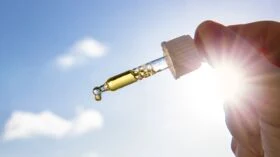THIRD COVID DOSE - The recall campaign begins this Monday, September 13. People over 65 and those at risk of severe forms of Covid-19 can make an appointment. For who? With which vaccine? Pfizer, Moderna, Janssen? What timeframe? Vaccination indications and schedule.
This booster dose is not mandatory. In addition, "the third dose of covid 19 will not have an impact on the health pass," said Olivier Véran, during his press conference on August 26. The health pass has been therefore always valid after the second dose, whether or not you make a third. Registrations for booster dose appointments are open on the Doctolib, KelDoc and Maiia platforms. For whom? How long after the second injection? With which vaccine? A messenger RNA vaccine? Pfizer or Moderna? When does the recall campaign start? What are the potential side effects?
Indications, eligibility of the 3rd dose: for whom, why?
With vaccination, "we are 8 times less likely to be contaminated, 11 times less likely to go to the hospital," said Prime Minister Jean Castex on RTL. However, recent studies suggest a reduction in the effectiveness of all vaccines, especially against the Delta variant. This decrease in protection mainly concerns infection and symptomatic forms of the disease. Health authorities and scientists are also observing a slight decrease in efficacy on severe forms that are still well covered by vaccines. This decrease in effectiveness not only affects the elderly and populations at risk of severe forms, but the latter remains the most affected. Hence the need for a booster dose of vaccine in these people (provided they have a complete vaccination pathway).
As a first step:
On 12 August 2021, the Ministry of Health confirmed the implementation of a vaccination booster campaign from mid-September for certain categories of people:
- Residents of nursing homes and long-term care units (LTCU): the recall campaign begins on September 13.
- People over the age of 80 living at home
- Immunocompromised people.
- People who have a very high risk of the severe form of Covid-19 including people with: moyamoya angiopathy, cyanogenic syndromic congenital heart disease with unstable heart failure, idiopathic pulmonary fibrosis, cystic fibrosis, amyotrophic lateral sclerosis (ALS), cerebral venous thrombosis, autoimmune pancreatitis...
- People 65 years of age and older
- People with comorbidities that increase the risk of severe forms of Covid-19.
- Trisomy 21
- transplanted solid organ or hematopoietic stem cells,
- renal insufficiency (dialysis)
- people with rare and severe pre-existing conditions or severe disabilities,
- diabetes (type 1 and type 2), obesity (BMI 30 kg/m2),
- cancer,
- COPD or respiratory failure
- heart failure
- complicated high blood pressure
- chronic liver disease
- psychiatric disorders,
- dementia,
- A history of a stroke...
Calendar: when does the recall campaign start in France?
Registration: how to make an appointment for the 3rd dose?
With which vaccine: Pfizer or Moderna?
After analyzing the available data, the HAS proposes a booster dose with a messenger RNA vaccine. In France, the two mRNA vaccines available are the Pfizer-BioNTech (Comirnaty®) and Moderna (Spikevax®) vaccines. Regardless of the vaccine used for primary vaccination with an mRNA vaccine, the HAS considers that there is not enough argument, to date, to preferentially recommend one vaccine over the other for the booster dose, as the two available mRNA vaccines (Comirnaty® and Spikevax®) are both very effective against severe forms of Covid-19, including those related to the Delta' variant
The delay between the 2nd and 3rd dose?
► For people, The booster dose should be given after at least 6 months after primary complete vaccination.
► For people first vaccinated with the Janssen vaccine, the booster dose should be given from 4 weeks after the first injection.
Where to do the 3rd dose?
The booster dose should be given at least 6 months after the last vaccine injection. From now on, and if this 6-month period is respected, the people concerned can make the vaccination appointment:
to their attending physician (or doctor of their choice);
in a pharmacy;
with a nurse;
in a vaccination centre
► The Health Insurance launched a postal mailing campaign in September to all people aged 80 and over indicating the procedure to follow to benefit from a booster dose or a first injection. Also communicated in the mail is the skip-the-line number to easily get an appointment in a vaccination center. This message will then be declined for 65-79-year-olds and sent to their Ameli account.
What are the side effects of the 3rd dose?
An Israeli preliminary study published on Reuters on August 8, 2021, conducted on 4,500 people who received a booster dose from July 30 to August 1, states that:
- 88% of people who received a third dose of the Pfizer vaccine 'experienced similar or lesser side effects than after receiving the second injection.
- 31% of them reported side effects, the most common being pain at the injection site.
- 0.4% reported breathing difficulties
- 1% said they sought medical treatment because of one or more side effects.











No comments:
Post a Comment